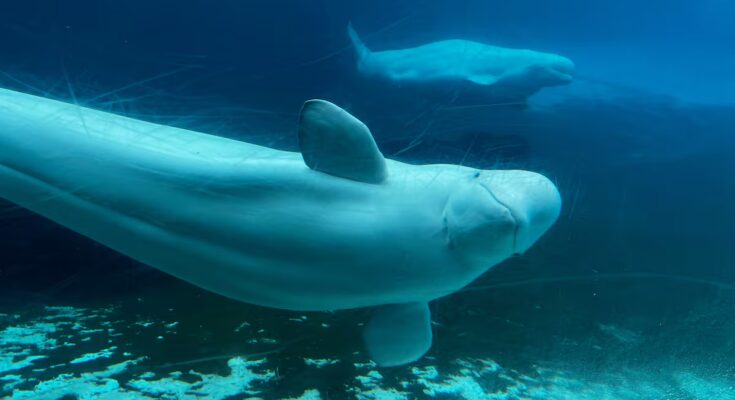The 30 belugas living in the Marineland water park in Ontario (Canada) are under threat of death, something they have so far managed to avoid. The entertainment center will close its doors in 2024 due to declining visitors and the owners say they cannot look after them. Meanwhile, two orcas remain in Antibes (France) in an uncertain limbo waiting for their future to be defined after the closure of another aquarium, also from Marineland. These cases demonstrate that, even in countries with advanced animal welfare laws, these regulations fail to secure the future of cetaceans once governments ban their display or establishments cease operations for economic or other reasons.
China’s water parks have become the most common destination to get rid of these mammals – especially dolphins, killer whales and beluga whales – when zoos are unwilling or unable to keep them. In January, the eight dolphins from the Madrid zoo were transferred to more modern facilities on the island of Hainan, the same place where the eight specimens from the Selwo Benalmádena Adventure Park (Málaga) were sent in September. The nine dolphins of Aquopolis Costa Dorada will leave in 2022, after the closure of the facilities.
Andrea Torres, biologist and coordinator of the Wild Animals Area of the FAADA foundation, warns of the “senselessness” of these transfers. “It’s like saying: okay, here we solve the problem and condemn the animals to find themselves in the same or worse conditions of exploitation in another place, no matter how much they have the latest technologies.”
The Canadian government refused to adopt this solution for the same reason cited by Torres. Belugas would be used showssomething banned in that country since 2019, although without retroactive effect, so that the Ontario aquarium can continue to operate. In France this practice was banned in 2021, while in Spain, although the law on animal welfare prohibits the use of wild animals in circuses, their exhibition in water parks and even their reproduction are still allowed, which prolongs the problem with new generations of cetaceans.
A study by the China Cetacean Alliance, an international coalition of organizations working for the protection and conservation of cetaceans, warns against boom of water parks in the Asian powerhouse, with legislation that does not consider animal welfare to meet the needs of cetaceans in captivity. The country is home to more than 1,300 captive cetaceans in approximately 99 aquatic parks, including 34 orcas.
China also allows the import of wild-caught specimens under certain research, breeding or education conditions, which is banned in Europe and most countries around the world. Since there is no explicit ban, NGOs think it could be a gateway for cetaceans trapped in the ocean at theme parks.
Maneesha Deckha, a law professor at the University of Victoria, British Columbia, uses the beluga case as an example of the difficulties that arise in providing effective protection for animals. Deckha explains in an article that the threat to sacrifice these specimens “reflects the ethical void in the Canadian legal system when it comes to animals.” The regulations “still allow” owners to kill their animals because they are considered “property.”
In Europe, killer whales Wikipedia24 years old, and his son Keijo12 years old, they live in limbo at the Marineland water park, on the French Riviera, near the city of Cannes. The center was closed in January, so the two specimens no longer perform shows to entertain the thousands of visitors, but they have not been relocated, nor have around ten dolphins. The conditions in which they live have been criticized by several NGOs.
Loro Parque, the only zoo in Europe where orcas are exhibited, offered to welcome them, but the international convention CITES, which regulates trade in endangered species of flora and fauna, opposed their shipment. The center believes that it is the only option left for the animals “faced with the alternative of euthanasia proposed in France” and has filed a contentious-administrative appeal, because they have not been able to receive the report which questions the suitability of their facilities.
The option of natural sanctuaries – a closed bay where you can live in semi-freedom – is gaining ground, but is still a distant possibility. Organizations such as Animal Justice and World Animal Protection support sending the 30 belugas to a sanctuary in Port Hilford, a city located in the province of Nova Scotia. But the facilities could only house between 8 and 10 specimens (of a single species or belugas and orcas) starting next summer, because although they have authorization from the provincial government, they still need permits from federal authorities.
Ontario park owners refuse to transport their animals to the sanctuary, deeming the site environmentally unsafe; They also questioned the venue’s financial plan. Marineland did not respond to this newspaper’s interview requests.
The solution is not simple due to clashes and conflicting opinions between the federal government, provincial authorities and the owners of the entertainment center. No one imagined that all this would end in 1961, when this water park, located very close to Niagara Falls, opened its doors. At its peak it had 1.5 million visitors a year. But in recent decades the number of visitors has drastically reduced, until it closed at the end of the 2024 summer season due to financial problems.
Adding to the growing public awareness of animal abuse has been a long list of complaints against Marineland. One figure clearly reflects this: since 2019, 19 belugas and one orca have died in its facilities. The park argued that the deaths were due to their life cycles.
In September, the owners of Marineland asked the federal government for permission to send the 30 belugas to a park located in the Chinese city of Zhuhai. But Fisheries and Oceans Canada denied this. The minister, Joanne Thompson, stressed that approval would mean “perpetuating the treatment these belugas have received”.
Two days later, they asked Thompson for financial support to care for the animals, with an ultimatum included: if they did not receive a positive response before October 7, the animals would be euthanized. A threat that has not materialized so far, but seems to have served to calm things down.
The minister called on Marineland to submit a new plan, signaling his willingness to grant a permit if it is the best scenario for the belugas. The law approved in 2019 in fact provides exceptions to the export ban for scientific reasons or if it is for the benefit of cetaceans. The Ontario government has also asked federal authorities to reconsider their refusal to transport the belugas to China.

